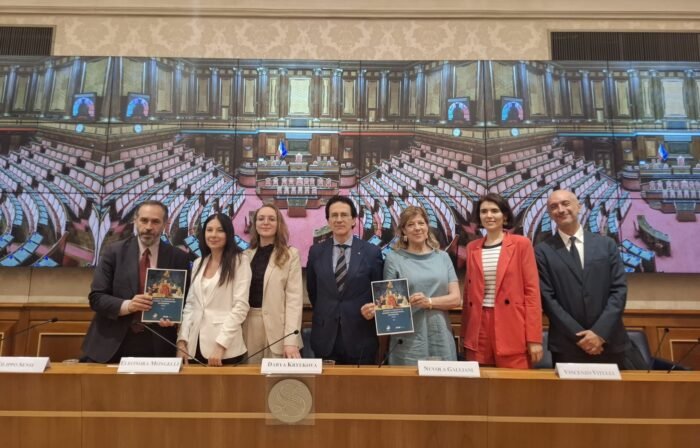On Friday, June 27, 2025, at the initiative of Senator Filippo Sensi, the Italian Federation for Human Rights (FIDU) held a press conference at the Senate to launch the report Italy’s Response to Transnational Repression, produced in collaboration with International Partnership for Human Rights (IPHR) and authored by Eleonora Mongelli, Alessandra Tursi, and Vincenzo Vitulli.
Senator Sensi opened the conference by highlighting the growing awareness within Italian institutions and Parliament of the threat posed by transnational repression (TNR), and the need for concrete action using the tools available to democratic states. He stressed the importance of coordination between countries and institutions, and the necessity of a strong institutional architecture to counter this emerging hybrid threat.
Eleonora Mongelli, FIDU Vice President and co-author of the report, referred to the G7 definition of TNR as an “aggressive form of foreign interference that undermines national security, state sovereignty, human rights, and international law.” She pointed out that similar — if not identical — methods are used by other authoritarian states, including China and Belarus. For this reason, the report’s findings and recommendations are relevant for addressing all forms of transnational repression. “At the core of our evaluation of Italy’s institutional response,” she explained, “are the testimonies of victims — both direct and indirect — alongside the perspectives of legal experts and human rights defenders.” Through the analysis of multiple case studies, the report maps the full spectrum of TNR tactics — from visible mechanisms like mobility control to more hidden and manipulative forms. These include judicial harassment, unlawful surveillance, doxing, intimidation, and indirect threats to family members in the country of origin. The report identifies patterns and systemic traits across cases, shedding light on how repression crosses borders and the major challenges faced by authorities, institutions, and civil society in responding effectively. Mongelli underscored two main institutional shortcomings in Italy: the absence of a legal definition of transnational repression, and the lack of widespread awareness of the phenomenon. These gaps undermine the state’s capacity to identify and respond to such violations systematically. The report concludes with a series of operational recommendations. These include strengthening institutional coordination (both within Italy and with other countries), improving the protection of victims—such as through secure and accessible reporting channels—and fostering collaboration between state institutions and civil society actors.
Among the report’s key findings:
- TNR incidents from the last four years were categorized into thematic sections, including those that occurred prior to and after Russia’s full-scale invasion of Ukraine.
- Italy has refused all extradition requests from Russia since 2022, invoking the principle of non-refoulement—a fundamental protection in both international and Italian law, which prohibits returning individuals to a country where they would face persecution, torture, or inhumane treatment. This principle is enshrined in Article 10 of the Italian Constitution and Article 2 of Legislative Decree 286/1998.
- However, procedural challenges remain. A notable example is the misuse of Interpol Red Notices for political persecution. In cases where an individual is detained based on a politically motivated Red Notice, the extradition process often continues even if Interpol later cancels the notice. The case of Ukrainian director Yevhen Lavrenchuk, detained in Italy on a Russian request later deemed abusive, illustrates the need for procedural reform and greater scrutiny of extradition requests from authoritarian states.
In terms of covert tactics, Mongelli explained that while there were no documented physical assaults in Italy, numerous dissidents reported surveillance, intimidation, and psychological pressure. These often involve indirect harassment through family members still living in the dissident’s country of origin. The Russian government, she noted, has developed sophisticated strategies to target dissidents abroad — including illicit monitoring, infiltration through community networks, digital harassment, and other forms of psychological manipulation.
“What makes these episodes so alarming,” Mongelli concluded, “is not their isolated occurrence, but their systematic nature. The fact that similar patterns are being replicated in different countries suggests the existence of an organized and deliberate strategy of transnational repression. Recognizing this structure is the first step toward countering it effectively.”
Nuvola Galliani, Legal Officer at IPHR, placed the report within a broader IPHR project tackling TNR globally, especially in Europe, where an increasing number of political dissidents seek refuge. Freedom House has documented over 1,000 cases of transnational repression since 2014, involving more than 40 origin countries and 100 host countries. The IPHR project aims to: document and analyze cases, strengthen the resilience of exile communities, offer legal and emergency support, and advocate for policy change. The report includes a comparative analysis of France, Germany, the UK, and Italy. It reveals shared weaknesses, including the absence of a legal definition of TNR, lack of institutional coordination, limited awareness of covert tactics, and inadequate victim support. It also shows how some countries have started to respond more decisively, especially by treating TNR as a national security issue or by advancing legal frameworks.
Vincenzo Vitulli, lawyer, FIDU Treasurer, and co-author of the report, explained the legal and technical methodology used. He emphasized how the lack of a legal definition in Italy impairs systematic recognition of these cases, which often go unnoticed. A unified approach, he argued, would allow for more coherent legal categorization and better protection for victims. The report recommends, among other things: formally recognizing TNR in national law; establishing dedicated support mechanisms for victims; improving interinstitutional coordination; and providing targeted training for magistrates, police, and public officials.
Darya Kryukova, a representative of Russi Liberi and a Russian political refugee in Italy, gave a powerful testimony of the psychological impact of TNR. She described the shift from physical repression to digital surveillance and intimidation, including threats to family members, undercover infiltration, and data gathering at public events — all contributing to an environment of fear and self-censorship. She also raised concerns about the influence of pro-Russian propaganda networks operating in Italy.


